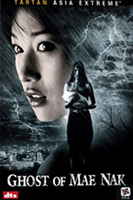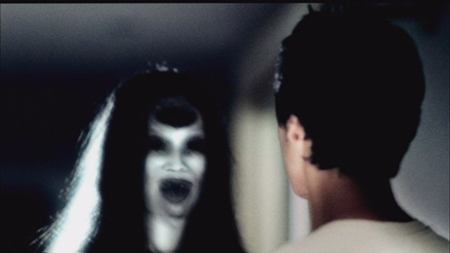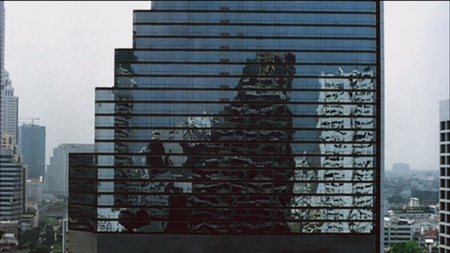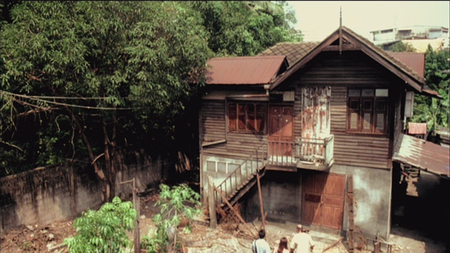 BUY IT AT AMAZON: CLICK HERE!
BUY IT AT AMAZON: CLICK HERE!
STUDIO: Tartan
MSRP: $22.95
RATED: NR
RUNNING TIME: 103 minutes
SPECIAL FEATURES:
• Set Visit
The Pitch
“It’s Romeo and Juliet has a nasty run-in with Hamlet’s father!”
The Humans
Pataratida Pacharawirapong, Siwat Chotchaicharin
The Nutshell
Mak and Nak love each other very much. They will be married soon. They want to buy a house together. They make poor real-estate choices. Look! It is a ghost of Mae Nak. She lives in this house. Hello, Miss Ghost! Will you be our friend? We will be your friend if you are nice to us. You have no teeth. You frighten us, Miss Ghost, and we don’t want to be your friend anymore.

"I was trepanned backwards and now I’m really angry."
The Lowdown
We can’t get away from our folk tales. You’ve gotta be jealous of those folks (or the progression of folks) who came up with the stories, because they found such memorable ways of communicating the basic components of fiction, and lessons or morality. The Ghost of Mae Nak is based on a Thai folk tale which occupies a space in the brain somewhere near our Western tale of the young hitchhiker, the forgotten scarf, and the parents who inform the kind driver that their daughter has been quite dead for years.
Mae Nak was a young woman in

It’s big. It has eyes. That’s all I need to know.
The poor, ghostly Mae Nak needed to hold on to the love of her husband. When Mak dies, Nak’s obsession continues, and she continues to haunt the city of
Once Nak the Living figures Nak the Dead’s goal, the movie takes a quick turn down The Sixth Sense lane. The strange feel-good tone of the living aiding the dead to their redemption fills up the second act, with considerably less tension. Where better ghost stories use the protagonist’s quest to aid a spirit into something of a self-reflexive spiritual journey, The Ghost of Mae Nak opts to give the living Nak tunnel vision. The result is a jeopardizing of most of the affection that saccharine-lovers may have built up during the film’s opening, lovey-dovey sequences.
Without an emotional component to foster audience interest, the scares have to stand on their own. Unfortunately, the activity of the ghost is inelegant and manifests spontaneously, meaning that there is no build up and, generally, somewhat truncated payoffs. There is some good gore — and a glorious death that’s a combination of the falling glass in Final Destination 2 and the horse dissection in The Cell — but it’s not enough to keep the momentum going.

I don’t see Ty Pennington offering to help victims of otherworldly abuse.
The conclusion returns to the mode of cautionary tale, but it’s an awkward conversion which turns the first and third acts into an unintentional frame story. With so much of the folk tale structure jettisoned in favor of the trappings of modern horror, the shift between old structure and new is ineffective. It’s especially noticeable in that a satisfying denouement gets cut short in order to introduce a series of “gotcha” endings that become successively more humorous.
Horror, as a genre, shouldn’t get stale, because it loses its power. The Ghost of Mae Nak starts out with enough promise: resurrect the things our ancestors used to be frightened of, and turn them loose in the modern world. The film’s failings arrive when the modern world swallows up the old terrors and makes them predictable and impotent. The film ends up an interesting cultural artifact, but completely unsatisfying as horror.
The Package
A typical outing from Tartan as regards the audio and video, which is to say that both are very good. (Though the soundtrack will summon a few unintentional laughs; it sounds like a 50s sci-fi deal, all string glissandos and wails.) The only bonus is a brief, uninformative visit to the set of The Ghost of Mae Nak.
5.4 out of 10